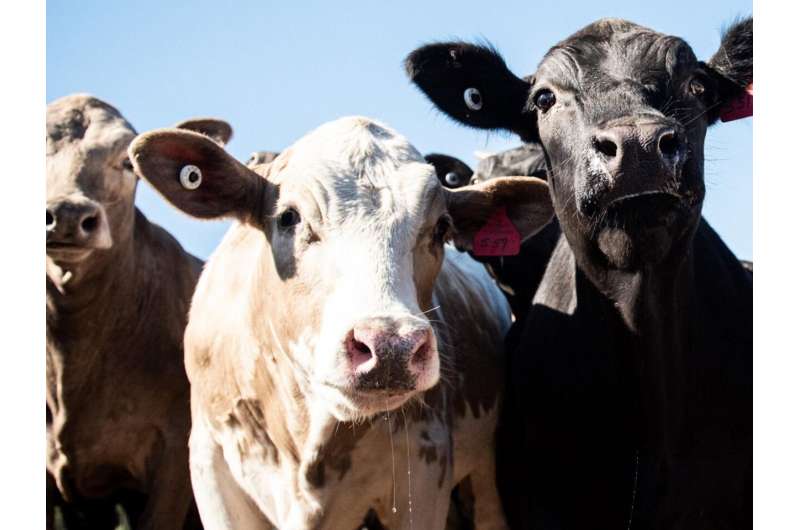This article has been reviewed according to Science X's editorial process and policies. Editors have highlighted the following attributes while ensuring the content's credibility:
fact-checked
peer-reviewed publication
trusted source
proofread
Study suggests Holstein dairy cows not harmed by producing beef crossbred calves

Facing economic challenges, dairy farmers are increasingly crossbreeding some of their Holstein cows with beef breed bulls to add value to surplus calves born in their herds. In an analysis of almost 40,000 cows, a team of Penn State researchers found that carrying and birthing the larger crossbred beef calves generally does not negatively affect dairy cow health.
The research, published in the Journal of Dairy Science, included records from 39,249 Holstein cows in 10 dairy herds in the Northeast and Midwest that had calves with known Holstein or beef breed sires from 2010 to 2023.
According to the researchers, calves sired by beef bulls were as likely to survive birth as those sired by Holstein bulls, with the exception of calves sired by crossbred beef bulls. The risk of a cow experiencing dystocia, or a difficult birth, did not differ by the sire breed of her calf. Likewise, clinical health events experienced after calving and early lactation cessation did not differ between cows that had Holstein or beef-sired calves.
Cows carrying beef-sired calves had increased gestational length compared to those carrying Holstein-sired calves. While calves sired by Angus bulls were only carried for one day longer than Holstein-sired calves, those sired by Limousin and Wagyu bulls extended a cow's gestation by five and eight days, respectively.
"Understanding the impact of different beef sire breeds on gestation length allows dairy farmers to plan for the longer pregnancies and adjust their operations accordingly," said the study's lead author Bailey Basiel, who graduated in May with a doctoral degree in animal science.
Significantly, cows that carried beef-sired calves did not differ in milk, milk fat or milk protein yield when compared with those that carried Holstein-sired calves, noted team leader Tara Felix, associate professor in the Department of Animal Science in the College of Agricultural Sciences and beef specialist at Penn State Extension.
"Our results suggest that current beef-dairy sire selection parameters in the United States are not negatively affecting the dairy cow," she said.
The study did not uncover any negative effects of Holstein dairy cows carrying and giving birth to beef crossbred calves, according to Basiel. That was likely because Holstein dairy cattle have large frames and are physically able to accommodate the beef crosses, she suggested.
"We didn't see any ill effects, at least in these herds that are using Holstein cows, and I think that's pretty reflective of the U.S. dairy population—we milk mostly Holsteins in this country," she said. "But the second most popular breed is Jersey. And when you compare a Jersey and a Holstein, physiologically, Jerseys are a lot smaller. Follow-up research will determine whether Jerseys can safely produce beef crossbreds without suffering health and milk-yield problems."
One important caveat to the study, Basiel pointed out, is that the Holsteins were all "multiparous cows," meaning they had already given birth at least once.
"It was not the first time they'd had a calf, and statistically, traumatic experiences during birthing are a lot more likely to happen the first time a cow is giving birth, because she's smaller and she's never done it before," Basiel said. "So, at least in these older cows—cows that have at least had one lactation before—we saw no differences in calving ease or stillbirth."
Adrian Barragan, associate research professor in animal science and extension veterinarian, and Chad Dechow, associate professor of dairy cattle genetics, contributed to this research.
More information: B.L. Basiel et al, The impact of beef sire breed on dystocia, stillbirth, gestation length, health, and lactation performance of cows that carry beef × dairy calves, Journal of Dairy Science (2023). DOI: 10.3168/jds.2023-24112
Journal information: Journal of Dairy Science
Provided by Pennsylvania State University



















